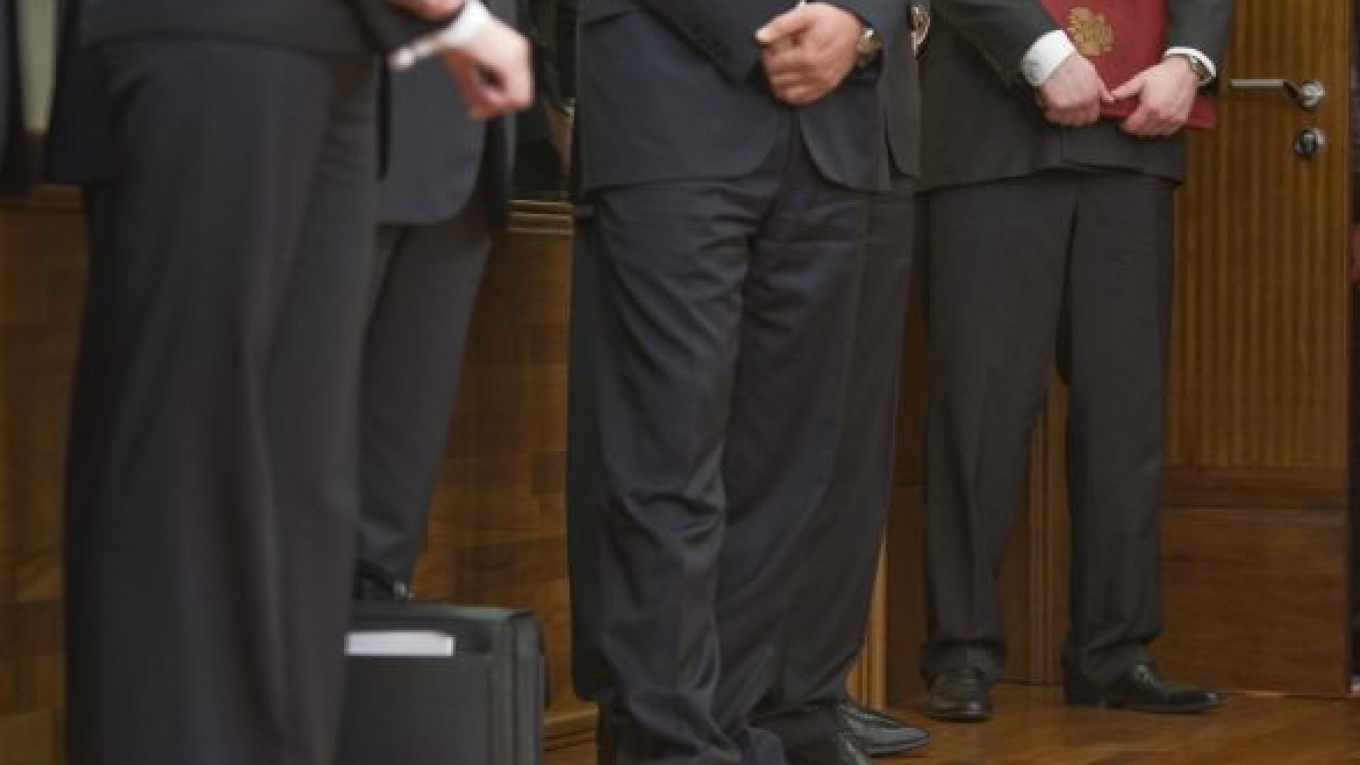President Dmitry Medvedev has ordered the government to oversee a 20 percent reduction of federal public servants, a move that could cost more than 100,000 officials their jobs over the next 27 months.
A quarter of the job cuts must be made by March 31, giving government agencies just three months to act, according to a decree? signed by Medvedev on Dec. 31 and published several days later on the Kremlin's web site.
The next quarter of the cuts must be completed during the following 12 months, while the rest must take place before March 31, 2013.
It was unclear Tuesday exactly how many officials will get pink slips, but analysts polled by The Moscow Times said bureaucrats have shown in the past that they can reduce their numbers on paper without really changing the size or the efficiency of the country's sprawling state apparatus.
According to the latest available figures on the State Statistics Service's web site, the number of federal officials stood at almost 880,000 in 2009, meaning that a 20 percent reduction would slash more than 175,000 jobs.
Finance Minister Alexei Kudrin said last fall that reducing the federal headcount by 20 percent would save the budget up to 43 billion rubles ($1.4 billion) per year.
The Finance Ministry did not offer a base number of officials, but Vedomosti has said 120,507 federal positions would fall under the order.
Government spokesman Dmitry Peskov said by telephone Tuesday that it was too early to say how many jobs would be affected.
Medvedev said in his decree that half the money saved by the shakeup should be spent on pay increases for remaining officials.
The president also specifically ordered the State Duma, the Federation Council, the Audit Chamber and the Central Elections Commission to make proposals of how to cut their administrative staff.
Medvedev first announced his plan to downsize bureaucracy last June when he ordered the government to draft a proposal.
The idea, initially floated by the Finance Ministry to help patch a budget deficit, has been called politically risky because it implies Medvedev's meddling in budget matters, which is generally handled by the Cabinet under Medvedev's mentor Prime Minister Vladimir Putin.
But similar staff-cutting initiatives during Putin's eight-year presidency invariably ended with the overall number of state servants increasing instead of falling.
Putin famously lambasted the state apparatus as cumbersome and ineffective in a 2002 state-of-the-nation address and ordered then-Prime Minister Mikhail Kasyanov to draft a reform of how to downsize it.
Kasyanov lost his job in the overhaul, and Putin slashed the number of federal ministries from 23 to 14 in another revamp after his re-election in 2004. (The number has since crawled up to 17.)
But at the same time, Putin oversaw a massive growth in public sector employees. This was done by the creation of new federal agencies like the Federal Drug Control Service and the introduction of federal districts, a whole new government tier sandwiched between the federal and regional levels.
As a result, the number of federal officials jumped from 522,500 to 878,000 between 2000 and 2009. The overall number of state servants burgeoned from 1.16 million to 1.67 million in the same period, according? to the State Statistics Service.
Yury Korgunyuk, an analyst with the Indem think tank, said government agencies in the past have cut vacant jobs or laid off those who planned to retire anyway.
"No bureaucracy wants to reform itself," he said.
Medvedev's order is easy to fulfill technically and politically, but the question is how to keep employee numbers from increasing in the future, said Dmitry Badovsky, a political scientist at the Institute for Social Systems at Moscow State University.
"Recent years have shown that whenever there is growth in the economy and the budget, there is also a tendency for growth in bureaucracy," he said.
The firing of tens of thousands of federal officials, analysts say, could also undermine electoral support for the current leaders, because they are a substantial part of their power base.
A Message from The Moscow Times:
Dear readers,
We are facing unprecedented challenges. Russia's Prosecutor General's Office has designated The Moscow Times as an "undesirable" organization, criminalizing our work and putting our staff at risk of prosecution. This follows our earlier unjust labeling as a "foreign agent."
These actions are direct attempts to silence independent journalism in Russia. The authorities claim our work "discredits the decisions of the Russian leadership." We see things differently: we strive to provide accurate, unbiased reporting on Russia.
We, the journalists of The Moscow Times, refuse to be silenced. But to continue our work, we need your help.
Your support, no matter how small, makes a world of difference. If you can, please support us monthly starting from just $2. It's quick to set up, and every contribution makes a significant impact.
By supporting The Moscow Times, you're defending open, independent journalism in the face of repression. Thank you for standing with us.
Remind me later.


